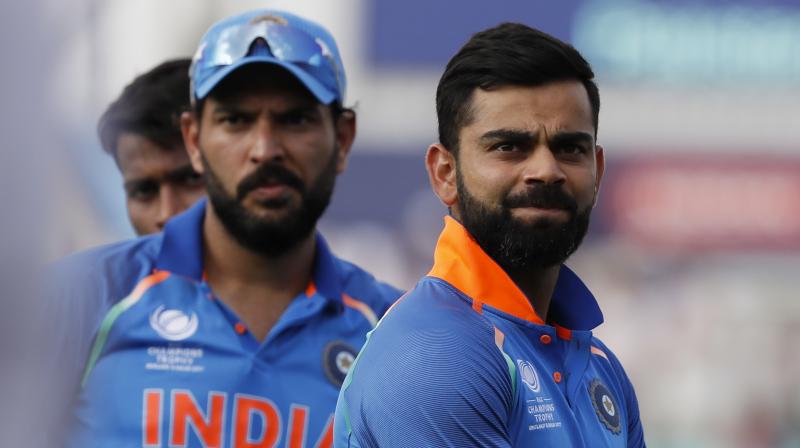ICC Champions Trophy, Ind vs Pak: 5 areas where Kohli's men lost the plot

London: Pakistan completed a remarkable performance against arch-rivals and defending champions India, to clinch their first ever ICC champions Trophy title at The Oval, in London, on Sunday.
The Pakistanis, who were handed 124-run thrashing at the hands of the same opponents in the group stage, scripted a wonderful turnaround story, as they came back from the brink of elimination form the early stages, to do their fair bit of giantkilling.
It was the complete opposite for India however, as they started out as one of the tournament favourites, and went on to script a few very convincing wins on their way to the final, where the finally lost the plot. Here, we take a look at what went wrong for Virat Kohli and co in the summit clash.
Fakhar Zaman, Azhar Ali’s solid start put Pakistan at an advantage
Virat Kohli may have won the toss and put Pakistan in to bat, but the flip of the coin was just about all that went right for India on the day. Pakistan openers Fakhar Zaman and Azhar Ali came out with intent and scored the big runs from the word go.
Although a mix-up while running between the wickets ended their opening stand at 128 runs, Zaman continued the onslaught even after Ali’s wicket. His blitzkrieg of an innings (114 from 106 balls) set the tone for the match, and India failed to recover from this big blow altogether.
Should India have gone with four seamers?
India had started with four pace bowlers – Umesh Yadav, Bhuvneshwar Kumar, Jasprit Bumrah, and Hardik Pandya – and one spinner – Ravindra Jadeja – in their first match. After the game, India skipper Virat Kohli had explained that he decided to go with just one spinner, as the Pakistanis have players who generally are good players of spin bowling.
Kohli’s assessment from the first game proved right in the final as well, although India lost the summit clash. Only this time, he decided to field two spinners – Ravichandran Ashwin and Ravindra Jadeja. The Indian spinners were absolutely clobbered on the day, as the trio of Ashwin, Jadeja, and part-timer Kedar Jadhav went for 164 runs in 21 overs; Jadhav was the only one of the three to take a wicket.
Mohammad Amir: The destroyer
He may have missed Pakistan’s semifinal triumph over England, but Mohammad Amir was back with a bang in the summit clash, as he opened bowling with great aplomb.
He was completely unplayable with the new ball, which he swung both ways, to trap the likes of Rohit Sharma and Skikhar Dhawan. The left-arm seamer also came out with a definite plan to bowl outside the off stump to Virat Kohli, who was cramped for room, as he tried to steer the ball onto the leg side. This helped Amir get the outside edge of Kohli – twice.
Over-dependence on top-three batsmen
Shikhar Dhawan, Rohit Sharma, and Virat Kohli have been exceptional with the bat so far, this season. Put together, the trio have scored 900 runs in the tournament. However, all three were completely undone in the final, as Amir bowled a lethal spell.
India never really recovered from this triple blow, even though they had batting strength, with the likes of Yuvraj Singh, Mahendra singh Dhoni, Kedar Jadhav, Hardik Pandya, Ravindra Jadeja, and Ravichandran Ashwin, all being recognised batters, following Kohli.
Should Pandya have batted higher up the order?
India needed a quick start with Pakistan having put up a massive total of 338 on the board. However, they never really got off the blocks in the second innings. Having lost the early wickets of Rohit, Kohli and Dhawan, India were in a soup. Not only did they need wickets in hand, but they also needed to score the quick runs.
Pandya, who came in at number seven showed some of the form that India desperately needed; however, they needed that kind of an innings at the top of their order. Things could well have turned out to be completely different, had Pandya had a specialist batsman at the other end. Experienced players like Dhoni or Yuvraj could have played the sheet-anchor role, while Pandya went on his blitzkrieg.
Pakistan skipper Sarfraz Ahmed himself had used a similar tactic in the first innings, sending in Imad Wasin ahead of himself, at a time when he knew that Pakistan needed quick runs.

